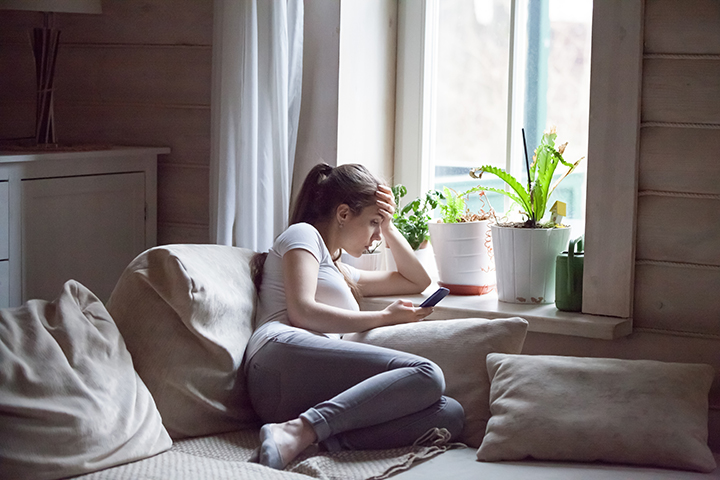A global pandemic: Uncharted territory for teens

Social distancing to stop the spread of COVID-19 can be particularly difficult for teens who may be missing out on big milestones such as graduations, proms and driving school all while being isolated from friends.
“This global pandemic is uncharted territory for children and adults alike,” says Adam Green, Clinical Coordinator, Child Development and Counselling unit at North York General Hospital.
Adam says people will react differently based on many different variables, including age, temperament, and living situation.
“While some teens will be anxious about getting ill from COVID-19, and some are feeling sad that they have not seen their friends for weeks, there are others who feel relief from reduced pressures at school socially and academically, or enjoy increased family presence in their lives,” says Adam. “As with any situation for parenting, there is no one size fits all during these times.”
Adam explains that one of the major developmental tasks of adolescence is to individuate, which means “going through a process of becoming their own distinct person.” This requires pushing away from caregivers, and may limit or make communication more difficult.
Many parents are understandably concerned about their teen’s well-being at this time and may be challenged to figure out how to check-in with their teens without seeming like they are hovering.
“During the quarantine many teens are spending even more time than usual isolating in their rooms because their options are limited,” says Adam. “This can raise parents’ anxiety, as they are unaware how their teens are doing.” Adam explains that many parents are themselves anxious during COVID-19 because of their own health, economic situation, and social isolation.
So before checking in with their teens, Adam believes it’s important for parents to ask themselves two questions: how can they stay calm instead of placing it on their child? And how much of their intervening is about calming themselves instead of actually helping their child?
Everyone is grieving the loss of normalcy to one extent or the other. Teens may be grieving the loss of seeing friends or extended family in person, routine of school, organized sports, graduation or prom. They may also be feeling anticipatory grief. What will happen with summer plans, such as jobs, camps, or concerts? What will happen with high school or university in the fall? When will things start returning to normal?
Adam points out a few ways parents and caregivers can help their children deal with grief:
Help them label their emotions (grief, anxiety, sadness, etc.)
- Encourage them to feel their feelings and not avoid them; accept what is in their control both to stay safe (social distancing, hand washing, etc.), and make the best of the situation (keeping up with a routine, family time, staying connected with friends, mastering a new skill), while trying to let go of things that are out of their control, such as when school will reopen.
- Balance out negative thoughts with positive ones. Remember that some of the brightest scientists and medical professionals around the world are working on vaccines and treatments.
- Think about three things that you are grateful for each day.
- Try to help others by making bracelets of hope, knitting and distributing masks, sending notes of kindness to others, etc.
Digital detox
While spending time on social media and video games is important for social connection, relaxation, and escapism, it is important to balance it with spending time in person with family, exercising at home, going for walks, reading, and engaging in hobbies that do not involve electronics.
“The most important way a parent can influence her/his teen is through role modelling,” says Adam. “So put away your phone and get moving. Invite your child to brainstorm how they can take a break from electronics and spend time together.”
Increased patience and flexibility is important during a stressful time such as this. Bedtimes and wake up will generally be later. Many of their friends may be staying up very late and they will want to as well. At the same time, routines and rules are still important.
“Speak with your teen about the pros and cons of good sleeping, eating, and exercise habits,” says Adam. “Most teens will be aware of how they are feeling and motivated to change, but it will be on their own terms and if you push, they will push back.”
When your patience is running thin, try to empathize with how your child is feeling. Remember that they are grieving their loss of normalcy.
Changes in behaviour
There is no one size fits all approach, every teen reacts differently and it is expected that there will be some changes during this abnormal times.
“Some signs that your teen may need additional mental health support includes, big changes in behaviour such as excessive worry or sadness, increased irritability, unhealthy sleeping or eating, extreme isolation, or use of alcohol or drugs,” says Adam.
While the need for mental health services for teens is up during this time, community supports are available. Immediate telephone or video mental health counselling can be accessed:
- What’s Up Walk-In clinics Monday-Friday 9 a.m. to 7 p.m.
- Mental Health T.O. at 1-866-585-6486.
- Kids Help Phone is available 24 hours a day, seven days a week at 1-800-668-6868
Therapists and psychiatrists at North York General Hospital’s Phillips House continue to be active seeing clients. The entire team was able to shift gears quickly to provide the needed mental health support virtually. Day treatment programs in both the Eating Disorders and Mental Health clinics are conducting virtual sessions with individual clients and in groups. At least one psychiatrist and therapist is on site during working hours for circumstances that require an in-person consultation.
